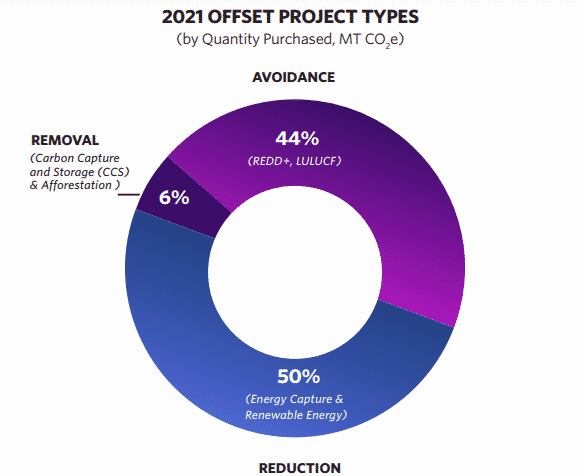Delta Air Lines bought 12 million carbon credits worth $137 million in 2021.
Delta is a US carrier that’s the world’s second-largest airline by revenue. It’s also one of the world’s oldest airlines in operation that has been around since the dawn of commercial aviation.
The global aviation industry accounts for about 2.1% of all CO2 emissions by humans.
Delta’s carbon footprint is its biggest environmental impact. In fact, 98% of its emissions come from its airplanes.
In its recent 2021 ESG report, Delta revealed its decarbonization pathway to reduce emissions and reach net zero no later than 2050.
The pathway also shows its plan to improve emissions intensity for 2035. These climate targets are pending validation from the Science-Based Targets initiative (SBTi).
Carbon offsets are one of the four levers that the carrier is focusing on to achieve its climate goals. While the three other levers are fleet renewal, operational improvements, and sustainable aviation fuel.
Delta Air Lines Carbon Offsets Program
In 2020, the US airline announced its commitment of $1 billion over the next 10 years to be carbon neutral. It is to fund efforts mitigating all emissions from its global business.
In 2021, Delta invested a total of $137 million in carbon offsets to balance 27 million Mt of unavoidable CO2 emissions.
Delta’s 2021 carbon offsets projects include renewable energy, landfill gas, and preventing deforestation. These offset projects come in three types:
Avoidance
Includes projects that work to avoid the release of emissions:
- REDD+: Reducing Emissions from Deforestation and Forest Degradation
- LULUCF: Land Use, Land Use Change, and Forestry
Reduction
Includes technologies or projects that increase the availability of renewable energy and convert waste into energy:
- Energy Capture
- Renewable Energy: projects like solar- and wind-generated power installations
Removal
Involves projects to remove CO2 from the atmosphere and store it:
- Carbon Capture and Storage (CCS)
- Afforestation
The pie chart shows the percentage of each type of Delta’s carbon offsets by the quantity bought.

As for other net zero levers, Delta achieved the following progress:
Fleet Renewal
Delta took delivery of 52 next-gen airplanes that were 25% more fuel-efficient per seat mile than retired planes. This contributed to a fleet-wide fuel efficiency improvement of 0.8% compared to 2020, resulting in total fuel savings of 22.5M gallons.
In May 2022, the carrier introduced its A321neo, the most fuel-efficient plane. It will help boost Delta’s progress toward emissions intensity improvements.
Sustainable Aviation Fuel
The US airline has set a 10% SAF consumption goal by the end of 2030.
Delta bought from Chevron a batch of co-processed fuel made from a feedstock of soybean oil. This co-processing pilot initiative led to 734 metric tons of CO2 reduction.
Moreover, Delta has signed agreements with 35 corporate customers and travel agencies as of March 2022. They are to fund SAF applicable for emissions from business travels on Delta. This corporate SAF program resulted in 1,747 metric tons of CO2 reduction.
Last March, the airline had closed a deal with Gevo, Inc. to supply Delta with 75 million gallons of SAF per year for 7 years starting in 2025. This agreement replaced their previous deal in 2019 and will boost the carrier’s goal of embracing SAF in its operations.
Operational Improvements
Delta has invested to hit a 25% electric ground support equipment (eGSE) fleet by the end of 2022 and 50% by the end of 2025.
In particular, Delta retired and replaced over 460 pieces of equipment with zero-emissions eGSE in 2021.
As of April 2022, 19% of Delta’s ground support equipment has been electrified.
Also, all 130 Delta 737-900ER planes are now equipped with split-scimitar winglets. This aerodynamic enhancement improves fuel efficiency by reducing lift-induced drag. As a result, the airline expects to achieve annual fuel savings of 8M gallons with this progress.
Delta Climate Advocacy
Going forward Delta expects to spend the rest of its $1 billion pledge on solutions other than carbon offsets as it advances toward net zero.
In its recent Climate Lobbying Report, Delta seeks to focus on investing in technological innovation. This particularly refers to the emerging carbon removal technologies, which include:
- synthetic hydrocarbon fuels,
- direct air capture (DAC),
- carbon capture and sequestration (CCS)
This new lever will support Delta Air Lines efforts to meet its long-term climate goals alongside using carbon credits to offset emissions.
Meanwhile, other major US airlines are also investing their time and money in their race to net zero.

